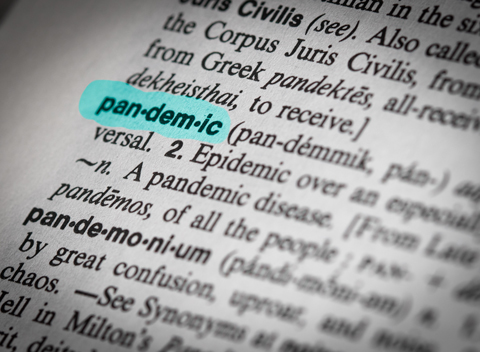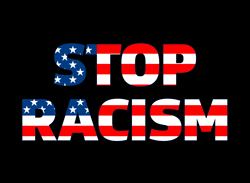Blursday. Unprecedented. Doomscrolling. And of course, Pandemic. These were the words that occupied our brains for most of 2020. Words, it turns out, can be a powerful thing—it’s how we express our feelings and emotions. And this year, during the worst pandemic in over 100 years, for many of us words became a coping mechanism. They defined the situation we found ourselves in and helped give meaning to the world and events unfolding before our eyes. Every year, wordsmiths like Merriam-Webster Dictionary and Dictionary.com select their word of the year and word lists of the year, as do other news organizations and magazines. Here is a sampling of their selections.
When it comes to words, Merriam-Webster Dictionary is the gold standard. Here is Merriam-Webster’s pick for word of the year, followed by their selections for the top 5 words of the year.
Word of the Year: Pandemic

|
“Sometimes a single word defines an era, and it’s fitting that in this exceptional—and exceptionally difficult—year, a single word came immediately to the fore as we examined the data that determines what our Word of the Year will be. Based upon a statistical analysis of words that are looked up in extremely high numbers in our online dictionary while also showing a significant year-over-year increase in traffic, Merriam-Webster’s Word of the Year for 2020 is pandemic. This has been a year unlike any other (the word unprecedented also had a significant spike in March), and pandemic is the word that has connected the worldwide medical emergency to the political response and to our personal experience of it all.”
#1 Coronavirus
“Rarely has a word moved from the jargon of medical professionals to the general public’s everyday vocabulary as quickly as coronavirus. Though not a new word, coronavirus rocketed from obscurity to ubiquity in a span of a few weeks. The word was largely ignored as the year began, but that changed on January 20, with the announcement of the first U.S. case of COVID-19. The largest spike in lookups came on March 19; overall, coronavirus was looked up a staggering 162,551 percent more this year than in 2019. The current pandemic is caused by a new, or novel, type of coronavirus dubbed COVID-19 in February. The name stands for “coronavirus disease 2019,” and was added to our dictionary in a special release of new words in March, giving COVID-19 the distinction of being the fastest term to go from coinage to inclusion in a Merriam-Webster dictionary—the process took only 34 days.”
#2 Defund
“Protests in response to the killing of Black people by police officers punctuated the year, and a word from those protests rose in lookups beginning in June: defund. The word was key in the many conversations about how to address police violence, as activists called for the defunding of police forces, and others tried to understand what that in practicality would mean. Overall, defund was looked up 6,059 percent more in 2020 than in 2019. We define defund as ‘to withdraw funding from.’ The word is a recent addition to English, in use only since the middle of the 20th century.”
#3 Mamba
“In January, the world lost one of basketball’s greats: Kobe Bryant, along with nine other people including one of Bryant’s daughters, died in a helicopter crash. As news of the crash spread, dictionary users searched for a word strongly associated with the player: mamba. “Black Mamba,” he was called—a nickname the player had chosen for himself more than a decade before. Mamba refers to “any of several chiefly arboreal venomous green or black elapid snakes (genus Dendroaspis) of sub-Saharan Africa,” and comes from the Zulu word imamba. The black mamba in particular is very fast, and very deadly. Mamba spiked in lookups on the day of Bryant’s tragic death, with users looking up the word 42,750 percent more than is typical.”
#4 Kraken
“On July 23, Seattle’s brand-new National Hockey League franchise chose “Kraken” as its team name, hurling the word kraken into top lookup territory. Searches for the word increased 128,000 percent that day. A kraken is a mythical Scandinavian sea monster; the word, which comes from Norwegian dialect, has been used in English since the middle of the 18th century. Krakens have featured in various contexts more familiar to English speakers than Scandinavian folklore, including various iterations of krakens in Marvel comics and a memorable monster in ‘Clash of the Titans.’”
#5 Quarantine

|
“As the reality of the global pandemic set in, policy responses received as much attention as medical analyses of this new disease. Accordingly, the biggest increase in lookups for one of the most important terms in this new circumstance, quarantine, was on March 20, nine days after the greatest spike for pandemic. Quarantine means’ a state of enforced isolation designed to prevent the spread of disease.’ It came into English through the intersection of French and Italian influences; the French word quarantaine (“about forty”) was borrowed in the late 1400s with a meaning of ‘a period of forty days.’ It later blended with the Italian word quarantena, meaning ‘isolation of a ship to protect the port city from potential disease.’ The Italian term was first used during the pandemic of bubonic plague in the 14th century.”
Click here to read more about Merriam-Webster's word of the year and top 10 words of 2020.
The New York Times took a slightly different route and selected The 20 Phrases That Defined 2020 writing “We picked up a whole new vocabulary this year—some of it words that have been around forever.” Here are 5 of their top phrases of the year.
Black Lives Matter

|
“These three words, Black Lives Matter, resurrected yet again to help remind the world that our fight for racial justice must happen through mass protests, electoral justice and the fight to defund and ultimately abolish the state of policing, and imprisonment as we know it. 2020 was not a year we all could have prepared for but it was a year that pushed us to become stronger, demand more from our elected officials and fight for the lives of Black people like we have never done before.”
Blursday
“The passage of time itself became seemingly unreliable this year, as some days felt like a week while some months flew by in an instant. This quickly became a go-to Twitter meme as the combination of a relentless news cycle mixed with the droll, repetitive reality of life in lockdown, giving existence in 2020 a Groundhog Day-esque quality. Our friends at The Washington Post even launched a newsletter called What Day Is It?”
Doomscrolling
“The catchall, platform-agnostic term for consuming bad news or information you know is detrimental to your mental health and wellness yet being unable to stop. ‘I think the doomscrolling thing validated a lot of people’s experiences,’ said the journalist Karen Ho, a.k.a. Doomscrolling Reminder Lady, who helped popularize the term with her eight-months-running nightly Twitter reminders to put the phone away and get to sleep.”
Virtual Happy Hour
“The early weeks of lockdown, like the virus itself, were novel. As people searched for new ways to stay entertained and hold onto some semblance of normalcy from home, the question of how to socialize was paramount. And so virtual happy hours became the event du jour. The wine—and quarantine—flowed as heavily as the Zoom event invites, and we all … well, we just got kind of drunk in front of our computers a whole bunch.”
Flatten the Curve

|
“It was back to middle-school math: To prevent hospitals from getting overwhelmed with Covid-19 patients, the country needed to reduce the overall number of virus cases and stop the exponential increase in infections. After nationwide lockdowns, we were generally successful at flattening the curve of the first surge: Confirmed cases peaked at around 33,000 in one day in mid-April and slowly declined until mid-June. Then the summer surge hit, causing that previously flat line to shoot upward for a month until reaching a second, higher peak in mid-July of about 75,000 cases in a day. After a seasonal low of about 25,000 cases on one day in early September, cases have been on the rise ever since.”
Dictionary.com looked at 2020’s words of the year by month, writing, “To acknowledge the multitude of other terms that directed our users’ interests and our work as a dictionary, we think it’s worth reviewing notable words that spiked or spoke to the unrest and transformation of this indelible year. But in revisiting all these terms, it’s unmistakable that the COVID-19 pandemic was the turning point and throughline for all the events of the entire year.”
Some of their top contenders included:
Social Distancing (April)
“No other term quite so specifically captures how the pandemic transformed life and language in 2020 than social distancing. In the past 20 years, social distancing was scientific jargon, but 2020 had us all talking like Dr. Fauci. The term was suddenly everywhere, from store signage requiring us to social distance to text messages about socially distanced hangouts.”
Conspiracy Theory (May)
“In a year when facts about COVID-19 had life-and-death consequences, 2020 also saw the troubling spread of conspiracy theories—including from the highest office in the land. That we frame such misinformation and disinformation in viral metaphors, like infodemic, has never been more apt and resonant.”
Karen (July)
“In 2020, the slang insult Karen went from an internet meme to a cultural touchstone of the year. By July, Karen had logged over two million views on our site following a series of viral videos showing white women, popularly labeled Karens, flouting pandemic safety regulations or calling the police on Black people.”
Absentee Vote (September)
“The 2020 presidential election didn’t just unfold during the pandemic. The pandemic also shook up the mechanics of democracy, restructuring campaigns, conventions, debates, and voting. To ensure people could vote safely amid a pandemic, many states broadened qualifications around absentee voting.”
Superspreader (October)
“In October, COVID-19 cases hit new highs in the U.S. as the country headed into what many are calling the long, pandemic winter. And major European countries imposed new lockdowns as they confronted a second wave. The month opened with staggering news: President Trump tested positive for the coronavirus.”